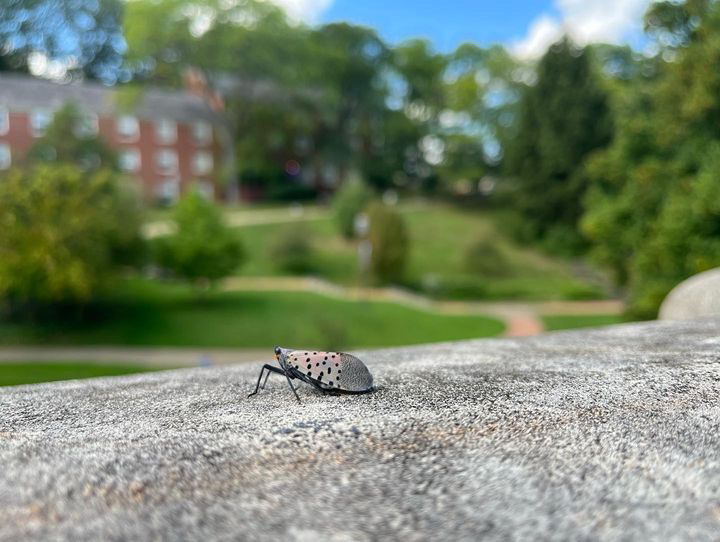As students, faculty and staff return to Chatham University for the fall 2023 term, one thing is clear: practically everyone across the University has killed their fair share of spotted lanternflies.
The lanternfly has threatened the health of native plants, potentially damaging Pennsylvania’s agricultural and economic health. The U.S. Department of Agriculture reports that the invasive species originated in China and first appeared in Pennsylvania in 2014. The presence of their invasive host plant, the tree of heaven, allowed the lanternfly population to grow at a swift rate in Pennsylvania.
Dr. Ainsley Seago, associate curator of invertebrate zoology at the Carnegie Museum of Natural History, spoke regarding the ease of transition for the lanternfly. Dr. Seago spent five years as the insect collection manager in Australia at the New South Wales department of primary industries biosecurity collection, focusing her work in preventing invasive species from crossing the border and spreading within Australia.
“We laid this perfect groundwork. We couldn’t have had a smoother landing for the spotted lanternflies because they got [to Pittsburgh], and the entire country is stocked with their favorite food,” Dr. Seago said.
Dr. Seago warned of the impact on plants as a result of sugary water called honeydew that is left behind by the spotted lanternfly. The honeydew prompts the growth of sooty mold, a fungal disease that can block direct sunlight and halt the process of photosynthesis in plants and trees.
While this effect alone may not instantly kill plants, it contributes to compounding effects from climate change including drought and temperature change, making plants more susceptible to disease.
“The more physically stressed they are, the weaker their immune response is going to be,” Dr. Seago said.
Although people may not see trees dying as a direct result of spotted lanternflies, they have been a pest to grapevines, apple trees and chestnut trees as lanternflies feed from their nutrients. Associate Dean at the Falk School and Associate Professor of Sustainability and the Environment Dr. Linda Johnson said the insects have an impact on agriculture.
“Especially at Eden Hall, when we think about our mission of thinking about sustainable food, that’s a problem when you can’t protect your food crops from these pests,” she said.
Economists within Pennsylvania State University College of Agricultural Sciences conducted studies assessing the economic impact of lanternflies and found that the spotted lanternfly could potentially cost Pennsylvania 2,800 jobs and $324 million annually.
Despite the extent of their damage being a recent topic of debate, experts seem to agree on one thing: the lanternfly has been raising awareness regarding the existence of invasive species as a whole.
“There’s not a lot of messaging around [invasive species] in the United States. We are much more [relaxed] with our biosecurity,” Dr. Seago said. “We don’t have the public messaging that other countries do.”
Sara Parker ‘23, a Communiqué contributor and sustainability student, acknowledged that while many Chatham students are generally aware of sustainability topics and environmental issues, lanternflies “can lead to a whole other realm of ecological awareness that, I think, isn’t necessarily something that the general student population is exposed to.”
As spotted lanternflies have appeared more frequently on campus, student awareness has increased, and with it, the efforts to step on them. The true effectiveness of killing individual lanternflies and how to properly eradicate the species is debated by many.
“I think the emphasis on everybody stomping on them is kind of silly. I don’t have a problem with that whatsoever, but the idea that it is going to do any good is just completely false. They’re here. That isn’t going to control them whatsoever,” said Assistant Professor of Water Resources Dr. Ryan Utz.
Dr. Seago compared the efforts to stomp on the lanternflies to recycling. She said that while many see no point in recycling when larger corporations don’t share the effort, others recycle regardless as a small way to help.
“One person is not going to eradicate the lanternflies by stomping on them, but 30,000 people could make a dent in their population if they’re getting out there and stomping,” Dr. Seago said. “It makes people feel good and it helps raise awareness of the idea of invasive species, which I think normal people could go through their whole day without thinking about. It’s an important problem for all of us.”




